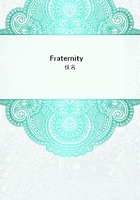
第14章
At five o'clock there was invariably a sound of plates and cups, and out of it the little model's voice would rise, matter-of-fact, soft, monotoned, making little statements; and in turn Mr. Stone's, also making statements which clearly lacked cohesion with those of his young friend. On one occasion, the door being open, Hilary heard distinctly the following conversation:
The LITTLE MODEL: "Mr. Creed says he was a butler. He's got an ugly nose." (A pause.)Mr. STONE: "In those days men were absorbed in thinking of their individualities. Their occupations seemed to them important---"The LITTLE MODEL: "Mr. Creed says his savings were all swallowed up by illness."Mr. STONE: "---it was not so."
The LITTLE MODEL: "Mr. Creed says he was always brought up to go to church."Mr. STONE (suddenly): "There has been no church worth going to since A. D. 700."The LITTLE MODEL: "But he doesn't go."
And with a flying glance through the just open door Hilary saw her holding bread-and-butter with inky fingers, her lips a little parted, expecting the next bite, and her eyes fixed curiously on Mr. Stone, whose transparent hand held a teacup, and whose eyes were immovably fixed on distance.
It was one day in April that Mr. Stone, heralded by the scent of Harris tweed and baked potatoes which habitually encircled him, appeared at five o'clock in Hilary's study doorway.
"She has not come," he said.
Hilary laid down his pen. It was the first real Spring day.
"Will you come for a walk with me, sir, instead?" he asked.
"Yes," said Mr. Stone.
They walked out into Kensington Gardens, Hilary with his head rather bent towards the ground, and Mr. Stone, with eyes fixed on his far thoughts, slightly poking forward his silver beard.
In their favourite firmaments the stars of crocuses and daffodils were shining. Almost every tree had its pigeon cooing, every bush its blackbird in full song. And on the paths were babies in perambulators. These were their happy hunting-grounds, and here they came each day to watch from a safe distance the little dirty girls sitting on the grass nursing little dirty boys, to listen to the ceaseless chatter of these common urchins, and learn to deal with the great problem of the lowest classes. And babies sat in their perambulators, thinking and sucking india-rubber tubes. Dogs went before them, and nursemaids followed after.
The spirit of colour was flying in the distant trees, swathing them with brownish-purple haze; the sky was saffroned by dying sunlight.
It was such a day as brings a longing to the heart, like that which the moon brings to the hearts of children.
Mr. Stone and Hilary sat down in the Broad Walk.
'Elm-trees!" said Mr. Stone. "It is not known when they assumed their present shape. They have one universal soul. It is the same with man." He ceased, and Hilary looked round uneasily. They were alone on the bench.
Mr. Stone's voice rose again. "Their form and balance is their single soul; they have preserved it from century to century. This is all they live for. In those days"--his voice sank; he had plainly forgotten that he was not alone--"when men had no universal conceptions, they would have done well to look at the trees. Instead of fostering a number of little souls on the pabulum of varying theories of future life, they should have been concerned to improve their present shapes, and thus to dignify man's single soul""Elms were always considered dangerous trees, I believe," said Hilary.
Mr. Stone turned, and, seeing his son-in-law beside him, asked: